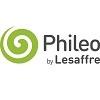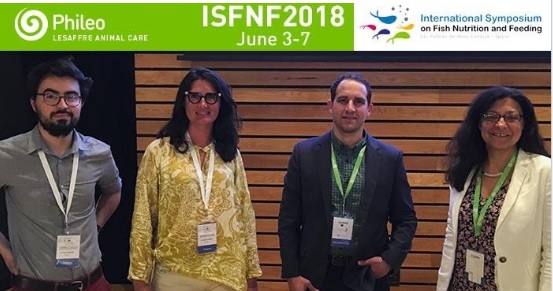
Content sponsored by:
Phileo by Lesaffre
Phileo kicks off aquatic summer in Las Palmas
Published: June 18, 2018
Source : Phileo Lesaffre Animal Care

Metabolomics strategy and recent animal trial data with plant based diets and yeast paraprobiotics presented at Phileo symposium paves the way for launching innovative solution for the aqua industry this summer.
Nothing is more precious than life, and that’s the philosophy that drives Phileo. As global population continues to increase, the world faces a growing demand for food and greater sustainability challenges.
Working at the crossroads of nutrition and health, Phileo is committed to delivering future evidence-based solutions that enhance farmed fish and shrimp health and performance, says Otavio Castro, Global Species Manager Aquaculture at Phileo. In each and every country, our team’s progress is led by the most advanced scientific outcomes as well as the field input of experienced farmers.
As active participant in oral presentations and poster presentations and as sponsor of 18th International Symposium on Fish Nutrition and Feeding, Phileo was pleased to invite all participants to the successful Phileo symposium entitled Applying yeast nutritional solutions for improved performance and health in trout and marine fish.
The incorporation levels of marine ingredients like fishmeal and fish oil are being drastically reduced in aquafeed formulas due to their decreasing availability worldwide and are being replaced by ingredients of more sustainable origin such as plant-based ingredients.
Inclusion of high levels of plant ingredients is still challenging, due to negative impacts on feed intake, perturbations of metabolic and health status, and growth performance slowdown, stated Dr. Sandrine Skiba-Cassy, Research Director Institut National de la Recherche Agronomique (INRA) in Saint Pée sur Nivelle (France).
The NINAqua project (New Ingredients for New Aquafeeds) aims to develop new diets devoid of fishmeal and fish oil by using vegetable biodiversity, processed animal proteins and new alternative ingredients as insects, yeast and microalgae. Funded by the French government and local authorities, the consortium co-ordinated by Le Gouessant a french feed production company is composed of academic research institutes (INRA, IFREMER and Institut Pasteur de Paris), private companies specialized in feed ingredient production (Lesaffre, Copalis, Algae Natural Food) and structures supporting producers of the French aquaculture sector (ITAVI, CIPA). The objectives of the partners of the NINAqua project are to determine the nutritional value of new diets for trout and seabass and investigate their impact of fish quality, resistance to pathogens, sustainability and social acceptance.
Among the different diets tested in rainbow trout, some of them were formulated on a vegetable basis and were supplemented with yeast protein sources. Results indicated that yeast protein supplementation may upgrade growth performance of trout fed plant-based diets totally devoid of fishmeal and fish oil. Surprisingly, it seems that yeast protein may also improve flesh quality by increasing DHA retention. Studies of cellular and molecular mechanisms are in progress to clarify the role of yeast protein on long chain highly unsaturated fatty acid biosynthesis.
Single cell protein sources such as yeast protein products could be an alternative solution to complement and mitigate detrimental effects of plant proteins, confirmed Dr. Nadège Richard, R&D Manager Aquaculture at Phileo. This was tested in a trial in which rainbow trout juveniles were fed with a plant-based diet yeast protein product insert brand name for 12 weeks. All along the trial, growth performances of the fish were improved according to increasing inclusion level of yeast protein. At the end of the feeding trial, immune status and gut health of the fish were assessed though histological analyses of distal intestine, and mRNA expression level measurements of immune-related genes in distal intestine. Those analyses were complemented by measurement of some plasma immune-related parameters. Results of this study showed that inclusion of insert brand name in a plant-based diet enables to improve rainbow trout gut health and global immune status.
Fishmeal of aquafeeds is an important source of selenium, an essential micronutrient required for normal development and growth, as well as for maintenance of metabolic functions, cellular antioxidant defense and good health status. Replacing aquafeed fishmeal with ingredients of plant origin usually equates to an important decrease in feed selenium content continued Dr. Richard.
We conducted a study in order to assess the impact of dietary selenium supplementation on growth performance and antioxidant status of rainbow trout fry fed a plant protein-based formula or a fishmeal and fish oil based one. Two forms of supplementation were compared: sodium selenite as inorganic form of selenium, and the selenium-enriched yeast Selsaf® as organic form. After 12 weeks of feeding, total selenium content as well as its speciation between selenomethionine and selenocysteine was measured in rainbow trout whole body. Antioxidant status of the fish was assessed through measurement of glutathione peroxidase activity and expression in whole body, and through calculation of the ratio between the reduced form and the oxidised form of glutathion in whole body. Obtained results highlighted the necessity in supplementing plant-based diets with selenium in order not to compromise the antioxidant status of the fish and to avoid fish flesh selenium depletion regarding human consumption. Concerning the comparison between the two forms of selenium supplementation, results showed the superiority of the organic form of selenium Selsaf® (selenium-enriched yeast) in increasing fish whole body selenium levels compared to the inorganic form sodium selenite, and revealed that this superiority is related to the ability of the selenium-enriched yeast to increase more efficiently selenomethionine contents.
These trials allow us to understand the impact of these new diets. However, it does not show how the fish metabolism uses the diet inputs. Metabolomics, the analytical strategy based on the non-selective chemical analysis of a biological system, completes the classic nutritional approach in fish nutrition to give us a better understanding of the diet impact. Our approach integrates the 1H-NMR metabolomic feed and fish metabolism assessment to understand the animal response to alternative diets, explained Simon Roques, PhD student at Phileo Lesaffre Animal Care.
Soluble compounds in feed play an important role on the feed intake and fish metabolism through various mechanisms. Thus, the feed chemical characterization is based on an ethanolic extraction to selectively retains small soluble compounds. A specific 1H-NMR sequence that reduces macromolecules signals is then used to acquire spectra on feed extracts. After post-processing, the spectra of experimental and control feeds are then compared to highlight differences in their composition and the most relevant signals are identified with 2D-NMR. Similarly, the analyses of individuals native plasmas provide data that can be analyzed by multivariate analysis to highlight biomarkers of the diet. The further analysis on liver and muscle will be integrated to complete our dataset and represent better the fish metabolism.
Today the Phileo product range of innovative solutions for aquaculture includes:
• Safmannan®, the premium yeast fraction rich in mannan-oligosaccharides and ß-glucans (1,3 and 1,6) delivers outstanding consistency and quality, for performance you can rely on every time. Safmannan® supports natural defences, reduces pathogen pressure and promotes gut function.
• Selsaf®, premium organic selenium enriched yeast, ensures a high concentration of organic selenium and a consistent composition. Selsaf® increases resistance to oxidative stress, promotes a faster recovery after pathological event, increases filet quality and ensures maintenance of anti-oxidative activity in a fishmeal replacement strategy.
On the cutting edge of innovation, Phileo has a dedicated R&D division present on Europe, America and Asia continents. Our nutritionists work in close collaboration with Lesaffre Corporate Research which focuses mainly on biotechnologies, as well as universities and reference research centers across the globe to improve farming and raising of all aquaculture species. The teams’ expertise includes both upstream and applicative fundamental in vitro research, covering different fields such as nutrition, microbiology, immunology, animal science and formulation processes. This contributes to the development of evidence-based solutions for the current and future needs of the aquaculture industry, said Gildas Joalland, Strategic Director at Phileo. He was pleased to announce Phileo will be launching summer 2018 an attractive source of highly digestible hydrolysed proteins and bioactive peptides, rich in essential amino acids, to improve animals’ feed intake, and performance in a cost effective dietary formula. Joalland was looking forward meeting the aquaculture industry for the launch in August at Aqua 2018 in Montpellier, France.
For Further information, please contact below: Clementine Mariën, Press contact Phileo Lesaffre Animal Care
Source
Phileo Lesaffre Animal CareRelated topics:
Mentioned in this news release:
Zinpro
Phileo by Lesaffre
Phileo by Lesaffre
Influencers who recommended :
Clara Berger, Otavio Serino Castro Recommend
Comment
Share
Recommend
Reply

Would you like to discuss another topic? Create a new post to engage with experts in the community.




.jpg&w=3840&q=75)